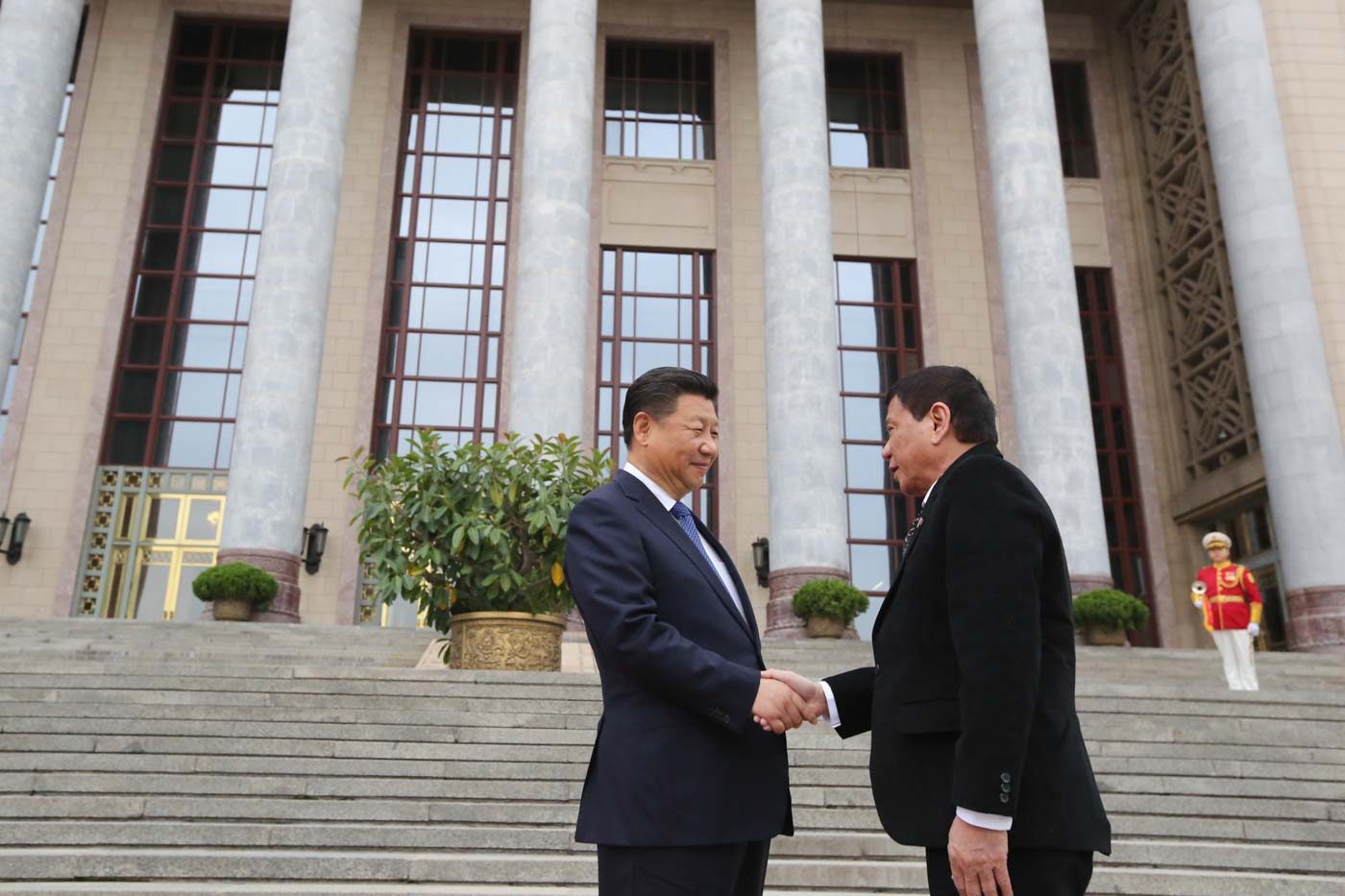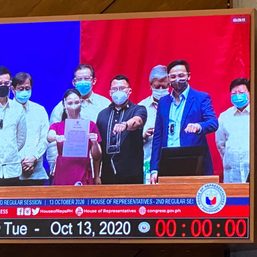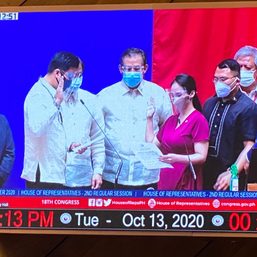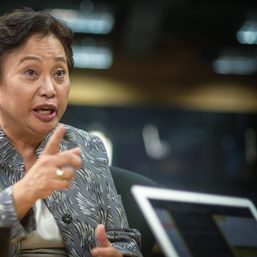SUMMARY
This is AI generated summarization, which may have errors. For context, always refer to the full article.


MANILA, Philippines (UPDATED) – Days before Chinese President Xi Jinping’s state visit to the country, the Philippines has been quietly preparing a framework agreement to jointly explore the South China Sea for oil and natural gas.
Rappler learned from 3 independent sources as of Monday, November 19, that select Philippine officials have been exchanging drafts of a proposed framework agreement. The signing of this agreement could be the highlight of Xi’s state visit to the Philippines – the first by a Chinese president in 13 years.
This information is corroborated by two opposition senators in a Senate resolution on Monday.
Senators Antonio Trillanes IV and Francis Pangilinan cited allegations “that China produced a draft entitled ‘Framework Agreement on Joint Maritime Oil and Gas Exploration between China and the Philippines.'” They said that “signing the Chinese draft violates the Constitution.”
On Tuesday, November 20, Trillanes’ office sent reporters a copy of the supposed draft that had come from China.
Read the document below:
In the draft from Trillanes, the oil firm chosen by China to undertake the joint venture is China-state owned firm China National Offshore Oil Corporation (CNOOC).
There is a blank left for the name of the Philippine enterpise chosen by the Philippines.
There is no final draft of the agreement yet as of Monday afternoon, or a day before Xi begins his two-day visit. It is also unclear if such a deal will be signed during Xi’s trip to the Philippines.
Both Malacañang and the Department of Foreign Affairs have been quiet about the proposed framework agreement.
Even Foreign Secretary Teodoro “Teddyboy” Locsin Jr categorically said in a tweet on November 8, “The Department of Foreign Affairs denies flatly that it has any knowledge or participation whatsoever in specific oil and gas deals. Zero.”
He said that this is not the “competence and jurisdiction or role” of the Department of Foreign Affairs (DFA), as this “is exclusively” the Department of Energy’s (DOE).
The Department of Foreign Affairs denies flatly that it has any knowledge or participation whatsoever in specific oil and gas deals. Zero. That is not DFA’s competence and jurisdiction or role; that is exclusively DOE’s. Period. https://t.co/IC7B3Zo8XW
— Teddy Locsin Jr. (@teddyboylocsin) November 8, 2018
In another tweet on November 2, Locsin said questions about any gas deal should be directed to Energy Secretary Alfonso Cusi.
“What gas deal? Let’s ask Cusi who is in charge of gas what deal because none exists so far as we know in the DFA. There’s talk; there’s always talk; but no JV draft nor hints of one at all – or it’s been kept from DFA. What I know is an Israel deal that Cusi invited me to witness,” said Locsin.
What gas deal? Let’s ask Cusi who is in charge of gas what deal because none exists so far as we know in DFA. There’s talk; there’s always talk; but no JV draft nor hints of one at all—or it’s been kept from DFA. What I know is an Israeli deal that Cusi invited me to witness. https://t.co/2pdW6fVxVu
— Teddy Locsin Jr. (@teddyboylocsin) November 1, 2018
Rappler sought Locsin for confirmation if such a draft framework exists, but Locsin has not responded to our messages as of posting time.
Days after Locsin tweeted about this, sources told Rappler that the DFA got a copy of a draft framework. Based on this draft, the DFA, along with its Chinese counterpart, is in charge of implementing the framework.
Presidential Spokesperson Salvador Panelo, also the chief presidential legal counsel, told Rappler on Monday that he has not seen the draft.
What the draft framework contains
Based on the document seen by Rappler, the final framework is unlikely to mention specific areas in the South China Sea where joint exploration can be conducted. It will instead mention key principles that the Philippines and China agree to be the basis for the joint venture.
A version of the draft states that “the joint oil and gas exploration shall not affect the respective positions on sovereignty and maritime rights and interests of the two parties.” The phrase “according to international law” was later on recommended, said one source.
One part of the draft agreement refers to the manner of settling disputes. One version of the document seen by Rappler states that dispute settlement will be done through “friendly consultation” between the Philippines and China. A government official has confirmed this detail with us.
In the same draft version, two entities will be in charge of implementing the agreement. An intergovernmental joint steering committee led by the Chinese foreign ministry and Philippine Department of Foreign Affairs with the help of the countries’ energy ministries.
A separate working group is composed of representatives from the selected Chinese and Philippine oil firms.
In their draft Senate resolution, Trillanes and Pangilinan also said China’s draft framework provides that the “joint oil and gas exploration shall not affect the respective position on sovereignty and maritime rights and interests of the two parties.”
The proposal involves two parties alone – the Philippines and China. It does not include Vietnam, another claimant country in the South China Sea.
With discussions on the framework agreement still ongoing, it’s still unclear what will end up in the final deal or even whether or not it can be signed before Xi departs for Beijing.
JMSU part two?
Critics already fear that the proposed joint exploration framework is a repeat of a controversial agreement signed during the Arroyo administration.
The Joint Marine Seismic Undertaking (JMSU) was an agreement signed by the Philippines and China through their national oil corporations on September 1, 2004, to jointly explore the South China Sea for oil and natural gas.
Vietnam, a claimant country in the South China Sea, later complained about this Philippines-China deal, prompting the two parties to include Hanoi in a tripartite JMSU on March 14, 2005.
The JMSU lapsed on July 1, 2008, but a case on the JMSU’s constitutionality is pending at the Supreme Court (SC).
The draft Senate resolution signed by Trillanes and Pangilinan said that a “non-transparent process” led to the signing of the JMSU in 2004.
The senators said this “should remind us to exercise extraordinary vigilance in any potential deal with China involving Philippine waters, the seabed, the subsoil, the insular shelves, other submarine areas, and their natural resources.”
On China’s proposed framework agreement this year, Trillanes and Pangilinan said, “Signing the Chinese draft violates the Constitution because the Philippines will lose its exclusive sovereign rights over its natural resources.”
Opposition senators: Do not sign the deal
The draft Senate resolution said the executive branch should “release the definitive draft of the oil and gas agreement with China” before any such agreement is signed.
The opposition senators urged the executive “not to sign any agreement with China or any other State which diminishes the Philippines’ exclusive right under domestic and international law to explore, develop, and utilize its natural resources.”
Xi is visiting the Philippines two years after Manila won a historic case against Beijing over the South China Sea, parts of which the Philippines claims as the West Philippine Sea.
Experts view joint exploration as a way for China to redeem itself after losing the South China Sea case filed by the Philippines. Joint exploration is expected to lead to joint development of oil and natural gas in the South China Sea.
But Philippine Supreme Court Senior Associate Justice Antonio Carpio, a leading expert on the West Philippine Sea, earlier said the Philippine Constitution bans joint development within the Philippines’ exclusive economic zone (EEZ). The EEZ is a 200-nautical-mile area from a coastal state’s baselines within which it has the exclusive rights to explore and exploit marine resources.
Carpio said in July 2016: “The exclusive economic zone is called ‘exclusive’ because it is exclusive to the coastal state, to the Philippines. That’s why you cannot have joint development with another country because international law and national law have said it’s exclusive.”
He asked, “Why do you want to share what’s exclusively yours?” – With a report from Camille Elemia/Rappler.com
Add a comment
How does this make you feel?
![[WATCH] #TheLeaderIWant: Filipino voters sound off on community issues a year before 2025 elections](https://www.rappler.com/tachyon/2024/05/filipino-voters-sound-off-on-community-issues-1.jpg?resize=257%2C257&crop=276px%2C0px%2C720px%2C720px)








There are no comments yet. Add your comment to start the conversation.